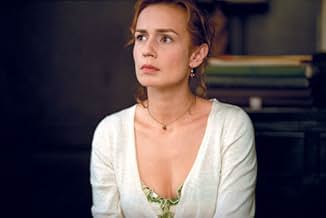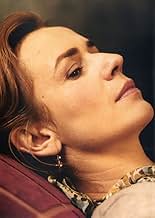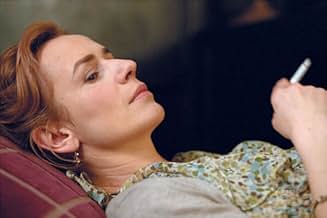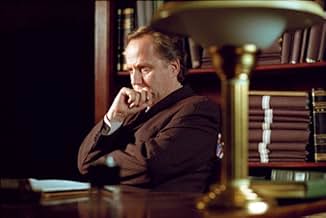IMDb RATING
6.9/10
5.4K
YOUR RATING
A Frenchwoman tells her marital troubles to a man she mistakes for a psychiatrist, and soon they form an unusual relationship.A Frenchwoman tells her marital troubles to a man she mistakes for a psychiatrist, and soon they form an unusual relationship.A Frenchwoman tells her marital troubles to a man she mistakes for a psychiatrist, and soon they form an unusual relationship.
- Director
- Writers
- Stars
- Awards
- 3 nominations total
Véronique Kapoyan
- Female Guard
- (as Véronique Kapoian)
Albert Simono
- Mr. Michel
- (as Alberto Simono)
- Director
- Writers
- All cast & crew
- Production, box office & more at IMDbPro
6.95.4K
1
2
3
4
5
6
7
8
9
10
Featured reviews
secrets beyond the door
Anna (Sandrine Bonnaire) has an appointment with her analyst, doctor Monnier (Michel Duchaussoy) to tell him her sentimental problems. But because of a little talky concierge and dimly lit, somewhat eerie corridors, she lands in William Faber's office (Fabrice Lucchini) who is a financial adviser. Expect the unexpected at least for a short time. Rather than telling her that he's not the right man to talk to, he listens to her very carefully and sets up a second appointment with her. The following week, he reveals her the truth but agrees to see her as many times as she wants to. Anna accepts his offer and these two idiosyncratic characters strike up an ambiguous relationship which will partly unveil their respective personalities, at least for William.
"Confidences Trop Intimes" is the successor of a peak in Patrice Leconte's eclectic filmography, "l'Homme Du Train" (2002) and if it doesn't exactly match the greatness of this film, it nonetheless remains a true winner which encompasses everything that makes Patrice Leconte a worthwhile filmmaker. First with this original starting point: a woman who was badly directed in a building winds up in an office belonging to a character who is a total stranger to her. But as doctor Monnier says: "there isn't a big difference between a shrink and a financial adviser: they have to define and solve their customers' problems. The difference is that to a financial adviser's his problems are bare while to an analyst's they're hidden".
Ambiguity is one of the key words to describe the relationships between William and Anna. Is Anna really in bad terms with her eccentric husband (stout Gilbert Melki)? Doesn't she try to manipulate her partner? Isn't she a little crazy? They're exciting questions that call upon the viewer's imagination. As for William, one realizes that the sort of therapy that links the two characters is mainly destined to him. He's probably THE main character of the whole film. At first, he seems strong but bit by bit he proves that he's a fragile character who yearns to change his life. His unexpected meeting with Anna gives him this opportunity and makes him elated for a while (see the delightful sequence when he dances to "in the Midnight Hour" by Wilson Pickett). But then his real personality appears: he's a rather vulnerable man who has trouble with women and perhaps that's why his wedding with his former wife (Anne Brochet) went unravel. Besides she tells him that he didn't make the first move to meet her.
Leconte is well served by his duo of actors and it's a real surprise to discover and appreciate Fabrice Lucchini in an introverted man whereas he is usually typecast in extrovert roles. Sandrine Bonnaire makes an ideal partner. One should also hail the filmmaker for having discerningly chosen the scenery of this idiosyncratic in camera. Dimly lit corridors and rooms are deftly incorporated to the plot and give a sultry sensation to the ambiguous relationship between William and Anne, a strong point that was tapped fifteen years ago in "Monsieur Hire" (1989) when Michel Blanc was alone in his cramped flat. Sandrine Bonnaire was then her partner. So, when the camera goes out into the open air, the interest depletes a little in spite of good moments. While I'm writing about this shortcoming, I could also regret a misunderstanding too quickly solved (the second time when William and Anna meet again, he tells her that he's not the right person) and mention a too much cozy end.
But overall, when you have a strongly built story which has a lot of space for surprises and the development of its characters and a lot of food for thought, you can skip without problems conspicuous faults and leave the projection with a big smile on your face. Once again Leconte filled me with joy. Recommended to his aficionados.
NB: the film was turned into a play three years later.
"Confidences Trop Intimes" is the successor of a peak in Patrice Leconte's eclectic filmography, "l'Homme Du Train" (2002) and if it doesn't exactly match the greatness of this film, it nonetheless remains a true winner which encompasses everything that makes Patrice Leconte a worthwhile filmmaker. First with this original starting point: a woman who was badly directed in a building winds up in an office belonging to a character who is a total stranger to her. But as doctor Monnier says: "there isn't a big difference between a shrink and a financial adviser: they have to define and solve their customers' problems. The difference is that to a financial adviser's his problems are bare while to an analyst's they're hidden".
Ambiguity is one of the key words to describe the relationships between William and Anna. Is Anna really in bad terms with her eccentric husband (stout Gilbert Melki)? Doesn't she try to manipulate her partner? Isn't she a little crazy? They're exciting questions that call upon the viewer's imagination. As for William, one realizes that the sort of therapy that links the two characters is mainly destined to him. He's probably THE main character of the whole film. At first, he seems strong but bit by bit he proves that he's a fragile character who yearns to change his life. His unexpected meeting with Anna gives him this opportunity and makes him elated for a while (see the delightful sequence when he dances to "in the Midnight Hour" by Wilson Pickett). But then his real personality appears: he's a rather vulnerable man who has trouble with women and perhaps that's why his wedding with his former wife (Anne Brochet) went unravel. Besides she tells him that he didn't make the first move to meet her.
Leconte is well served by his duo of actors and it's a real surprise to discover and appreciate Fabrice Lucchini in an introverted man whereas he is usually typecast in extrovert roles. Sandrine Bonnaire makes an ideal partner. One should also hail the filmmaker for having discerningly chosen the scenery of this idiosyncratic in camera. Dimly lit corridors and rooms are deftly incorporated to the plot and give a sultry sensation to the ambiguous relationship between William and Anne, a strong point that was tapped fifteen years ago in "Monsieur Hire" (1989) when Michel Blanc was alone in his cramped flat. Sandrine Bonnaire was then her partner. So, when the camera goes out into the open air, the interest depletes a little in spite of good moments. While I'm writing about this shortcoming, I could also regret a misunderstanding too quickly solved (the second time when William and Anna meet again, he tells her that he's not the right person) and mention a too much cozy end.
But overall, when you have a strongly built story which has a lot of space for surprises and the development of its characters and a lot of food for thought, you can skip without problems conspicuous faults and leave the projection with a big smile on your face. Once again Leconte filled me with joy. Recommended to his aficionados.
NB: the film was turned into a play three years later.
clever and brilliant, a light hearted exploration of the depths
This is a very clever film with a lot to say about life, death, sex, human relationships, human fragility and loneliness - but it does it all with a wonderfully light hearted touch. Luchini dancing just has to be one of the best scenes - eat your heart out Hugh Grant!! Bonnaire is quite wonderful as Anne, literally blossoming before our eyes, her hair lightening, her skin glowing, her dress changing, becoming lighter and brighter. It seems her accidental psychiatrist does help her. Of course, we never know the full truth - can we believe everything she says - and the device of the windows, so key to the film's turning point, is Hitchcockian in the extreme - vision as deception. The most wonderful insight of this film, though, is that paying taxes and dealing with deep disturbing psychological issues have similar concerns - what do you declare and what do you try desperately to hide? And of course, both actions are undertaken in the name of individuals integrating themselves into society. Another excellent film from Leconte. Just because it is so polished and masterful story telling doesn't mean that it doesn't address other issues that a director such as Rohmer would tackle.
Intriguing, minimalist, and yet uplifting
It is sometimes difficult to walk the fine line between comedy and banality, as well as hiding all the wire and papier mâché that form the construct known as thriller. "Confidences trop intimes" cunningly avoids the traps of both genres by simply shaking the constructs off, layer by layer.
The movie belongs to a genre, "comédie dramatique" ("dromedy"?) which usually in US movies is reserved for romance "chick flicks". Yet these intimate strangers bring quite a bit more to the screen. It's a pleasant relief to see them saying so much with so little, avoiding those deep memorable lines that are so out of place in the mouth of the common people movies of these kind are supposed to represent.
It's by juxtaposition that Leconte achieves the best effect, by not saying too much and underplaying it, always. In one memorable scene the lonely célibataire glances at the stages of life through his window. Through the glass of the opposite building he sees passion, argument and old age as the seemingly inevitable stages of life. His life seems codified, chosen by others and kept and controlled, in the good and in the bad: add the secret ingredient, an excellent Sandrine Bonnaire, and stir.
The film amusingly deconstructs the myth of psychoanalysis, and thanks to the great empathy of the Luchini character, succeeds in expressing the inexpressible, the desire, the longing sometimes solitary and hopeless. 9/10!
The movie belongs to a genre, "comédie dramatique" ("dromedy"?) which usually in US movies is reserved for romance "chick flicks". Yet these intimate strangers bring quite a bit more to the screen. It's a pleasant relief to see them saying so much with so little, avoiding those deep memorable lines that are so out of place in the mouth of the common people movies of these kind are supposed to represent.
It's by juxtaposition that Leconte achieves the best effect, by not saying too much and underplaying it, always. In one memorable scene the lonely célibataire glances at the stages of life through his window. Through the glass of the opposite building he sees passion, argument and old age as the seemingly inevitable stages of life. His life seems codified, chosen by others and kept and controlled, in the good and in the bad: add the secret ingredient, an excellent Sandrine Bonnaire, and stir.
The film amusingly deconstructs the myth of psychoanalysis, and thanks to the great empathy of the Luchini character, succeeds in expressing the inexpressible, the desire, the longing sometimes solitary and hopeless. 9/10!
Highly recommend
I actually went to my local "art house" movie theater to see "Napoleon Dynamite." I walked out of that movie after the first 10 minutes and walked into the movie playing in the room next to it, which happened to be "Intimate Strangers." I had no idea what this movie was about - in fact, had never heard of it but anything had to be better than "Napoleon Dynamite." What a pleasant surprise. Even though I missed the very beginning of the film, I figured out that Anna had a reversal problem and was visiting the wrong professional.
This movie explores a relationship of the mind, only hinting at the sexual. How refreshing!
This movie was entrancing. I fell in love with all of the characters. Who could not fall in love with Anna? How many times has a stranger walked into your life and you've found yourself captivated? Once - maybe twice? Perhaps I can ask that question since I met my husband due to circumstances that allowed our paths to cross (and any change in the smallest decision would have meant we would never have met) and within three days, we were planning a wedding. That was 20 years ago.
So no wonder I love this movie!
This movie explores a relationship of the mind, only hinting at the sexual. How refreshing!
This movie was entrancing. I fell in love with all of the characters. Who could not fall in love with Anna? How many times has a stranger walked into your life and you've found yourself captivated? Once - maybe twice? Perhaps I can ask that question since I met my husband due to circumstances that allowed our paths to cross (and any change in the smallest decision would have meant we would never have met) and within three days, we were planning a wedding. That was 20 years ago.
So no wonder I love this movie!
A strange relationship
A woman with marriage problems mistakes a financial adviser for a psychiatrist. She tells him all the secrets of her life, whereas the man has not the strength to tell he's not the person she needs to talk to...
"Confidences trop intimes" is a brilliant film directed by Patrice Leconte, with two big French actors -Fabrice Luchini and Sandrine Bonnaire. The film is an intimate comedy, action is made by good dialogs. There's no boredom at all.
It's an interesting movie which shows a strange relationship growing -maybe the woman understands, later, that she has not found the right person. But she's lonely and needs to talk, at the same time the financial adviser is another lonely person who needs someone who catches him out of a boring life. They have nothing in common, but they are made for each other.
The film has a strong screenplay and is supported by the two leading actors -the scenes are almost always between them. The two characters are very deep, the intensity of their words and of their expression doesn't make you feel that the picture misses something. Because everything it's here. The film is able to picture a situation of everyday life, without developing a foreseen love story... Will the two live a real love relationship? We don't know exactly, there's the same ambiguousness which often dominate the relation between a man and a woman...
A very good movie.
"Confidences trop intimes" is a brilliant film directed by Patrice Leconte, with two big French actors -Fabrice Luchini and Sandrine Bonnaire. The film is an intimate comedy, action is made by good dialogs. There's no boredom at all.
It's an interesting movie which shows a strange relationship growing -maybe the woman understands, later, that she has not found the right person. But she's lonely and needs to talk, at the same time the financial adviser is another lonely person who needs someone who catches him out of a boring life. They have nothing in common, but they are made for each other.
The film has a strong screenplay and is supported by the two leading actors -the scenes are almost always between them. The two characters are very deep, the intensity of their words and of their expression doesn't make you feel that the picture misses something. Because everything it's here. The film is able to picture a situation of everyday life, without developing a foreseen love story... Will the two live a real love relationship? We don't know exactly, there's the same ambiguousness which often dominate the relation between a man and a woman...
A very good movie.
Did you know
- ConnectionsFeatures Le concept subtil (1981)
- How long is Intimate Strangers?Powered by Alexa
Details
Box office
- Gross US & Canada
- $2,110,589
- Opening weekend US & Canada
- $55,836
- Aug 1, 2004
- Gross worldwide
- $10,485,817
- Runtime
- 1h 44m(104 min)
- Color
- Sound mix
- Aspect ratio
- 2.35 : 1
Contribute to this page
Suggest an edit or add missing content




































